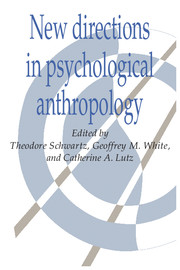Book contents
- Frontmatter
- Contents
- List of contributors
- Introduction
- I Cognition and social selves
- 1 Ethnopsychology
- 2 Cognitive anthropology
- 3 Schemes for schemata
- 4 The woman who climbed up the house: some limitations of schema theory
- II Learning to be human
- III The body's person
- IV Psychiatry and its contexts
- V Psychoanalytic approaches
- VI Disciplinary perspectives
- Index
2 - Cognitive anthropology
Published online by Cambridge University Press: 05 June 2012
- Frontmatter
- Contents
- List of contributors
- Introduction
- I Cognition and social selves
- 1 Ethnopsychology
- 2 Cognitive anthropology
- 3 Schemes for schemata
- 4 The woman who climbed up the house: some limitations of schema theory
- II Learning to be human
- III The body's person
- IV Psychiatry and its contexts
- V Psychoanalytic approaches
- VI Disciplinary perspectives
- Index
Summary
In the past decade there has been a convergence in cognitive anthropology toward the use of schema theory. Work in a variety of fields – in lexicology, in folk theories, in folk taxonomies, and in the study of the relationship between culture and inference – has moved towards the general conclusion that adequate description of cultural symbols from the word level to the level of large knowledge systems requires explication of the basic cognitive schemas which underlie these symbols. This does not mean that schema theory alone will account for all the phenomena studied by cognitive anthropologists, but rather that schemas form basic building blocks for more complex kinds of organization.
There is a large body of work which supports this conclusion (Casson, 1983). For example, in the field of lexical analysis, Fillmore (1975, 1977) has made the case that definitions based on a feature checklist, such as the definition of a bachelor as an “unmarried man,” are seriously inadequate. Fillmore argues that understanding of the meaning of a term requires understanding the simplified world on which a term is predicated. One piece of evidence for this view is that when a term is used in a context which does not fit this simplified world, the result is a semantic anomaly.
- Type
- Chapter
- Information
- New Directions in Psychological Anthropology , pp. 47 - 58Publisher: Cambridge University PressPrint publication year: 1993
- 2
- Cited by



